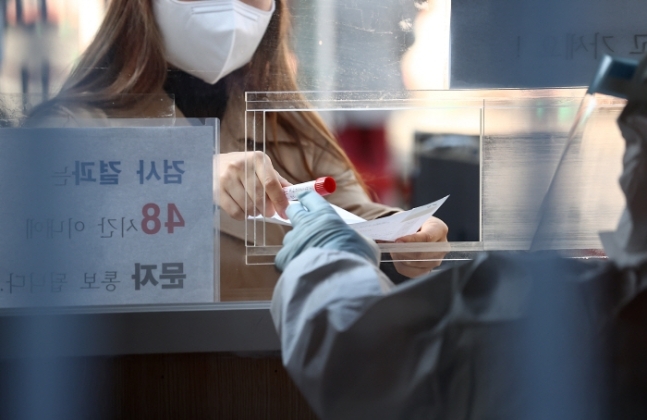 |
(Yonhap) |
As the third wave of the pandemic continues, the number of new confirmed cases remain in the mid-300s, while more than 21,000 doses of vaccines have been administered as of Monday.
The government’s central response team said Monday the number of new COVID-19 cases increased by 355 to 90,029 as of midnight. The figure declined by one from the previous day, staying in the 300s for the second consecutive day apparently due to the number of inspections having decreased over the weekend.
Of the new confirmed cases, 338 were locally transmitted and a majority came from the Seoul metropolitan area. Gyeonggi Province had the largest number of 156 confirmed cases, while Seoul had 92 and Incheon had 14.
The number of imported cases was 17, down five from 22 the previous day. Five of the cases were confirmed during quarantine at airports and ports. The remaining 12 were test positive while under isolation at local residences or temporary living facilities.
The number of new confirmed case rose past 600 once last month due to a series of mass infections right after the Lunar New Year holiday, but has recently dropped between 300 and 400. Still, sporadic cases have been reported at work places and gatherings.
Last month, a total of 13 confirmed cases were traced to a gathering of friends in Gwangjin-gu, Seoul, 10 people were infected at a daycare center in Dongducheon, Gyeonggi Province and a total of 44 confirmed cases were traced to a fitness center in Jeonju, North Jeolla Province.
The government has extended the current social distancing measures -- Level 2 in the Seoul metropolitan area and Level 1.5 in the non-capital area -- and the ban on gatherings of more than five people until March 15.
On Friday, South Korea began immunizing its citizens starting with medical workers and nursing home residents and has now vaccinated more than 21,000 people.
A total of 21,177 people have received the jab with 20,613 receiving vaccines from AstraZeneca vaccines and 564 from Pfizer.
AstraZeneca vaccines are being given to people under 65 in hospitals and nursing homes, while Pfizer vaccines are being administered to workers at hospitals treating COVID-19 confirmed patients.
The government said on Sunday that a cumulative 112 instances of adverse reactions were reported after people were given the vaccination. Among them, 111 people reported side effects after receiving AstraZeneca vaccines and one from Pfizer.
The most frequent adverse reactions were headaches, fever and nausea. This is a symptom that can occur during immunity formation and most of it disappears within three days, the government said.
There were no cases of anaphylaxis, a serious allergic reaction that may cause death. Anaphylaxis usually occurs within 30 minutes of inoculation so recipients are required to stay at vaccination sites for about 30 minutes after receiving the injection for observation.
By Shin Ji-hye (
shinjh@heraldcorp.com)








